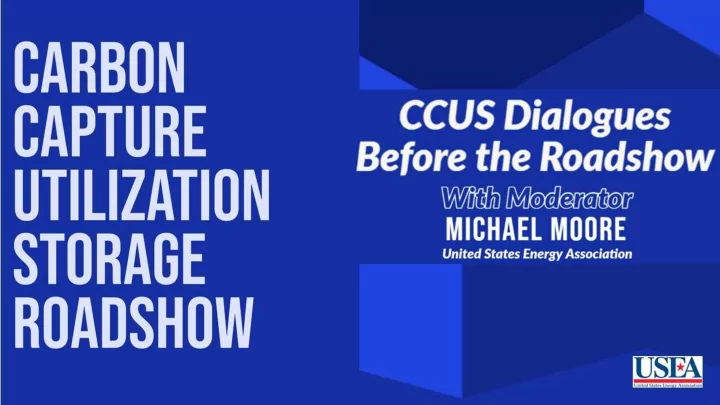

CONSENSUS Program Webinar Update on DOE Office of Fossil Energy’s New Advanced Energy storage Program With Speaker Briggs White
The CONSENSUS Program educates the public, policy makers, industry, and other stakeholders and builds a consensus on the benefits of, and requirements for C arbon C apture U tilization S equestration and Clean Coal technologies. • Briefings • Workshops • Reports • Monthly News Clips To subscribe to our mailing list, please email Michelle Littlefield at mlittlefield@usea.org
CCUS Beyond 2020 Fred Eames Partner, Hunton Andrews Kurth LLP May 6, 2020
Will the Virus Kill CCUS? No. • Compelling Imperatives and Incentives • Climate action has public support • ESG investing is on the rise • Corporate climate pledges are increasing Industrial processes need fossil fuels = CO2 output • • The 45Q tax credit is in place and drives interest
EOR or Dedicated Storage? • EOR • Dedicated Storage • Positives • Positives • Well-understood risk profile • Lower project interrelationships risk • Long experience with regulators and regulatory structure • Higher tax credit • Fewer landowners • Clear qualification criteria for 45Q credit • Challenges • Challenges • Economic turmoil • Less experience with geological • Lower credit under Section 45Q formations, less risk certainty • Some uncertainty on 45Q • Relatively high regulatory qualification burden, little regulatory experience, slow permitting • Larger project footprint May 6. 2020 6
What Policy Changes Are Needed • Class VI UIC Program Reform – NPC Study Recommendations for Dedicated Storage? • Risk-based structure for the UIC program • Current program prohibits movement of contaminants into USDWs, irrespective of risks to human health; “endangerment” should be risk- based • Monitoring flexibility • Appropriate indirect monitoring should be able to substitute for monitoring wells • Financial responsibility • Conservative remediation cost estimates drive unnecessarily expensive financial responsibility • Post-injection site care period • Area of review • Bifurcate to have separate standards for CO2 plume and pressure plume • Class VI program funding • Aquifer exemptions • Apply the UIC two-part test to Class VI (no potential for USDW use as drinking water) May 6, 2020 7
What Policy Changes Are Needed • Class VI UIC Program Reform – NPC Study Recommendations for Dedicated Storage? (cont’d) • State Primacy for Class VI Program • North Dakota – complete; Wyoming – proposed rule; Louisiana – pre- application • Note: Michigan seeking primacy for Class II (oil and gas wells) • Other • Well construction standards • Reactivate Class V for GS research-scale projects • Set goal for timeliness of permit issuance • Undertake the promised periodic review of the Class VI program • Property rights • Access to pore space • Maintenance of surface rights for PISC period May 6, 2020 8
Recommend
More recommend